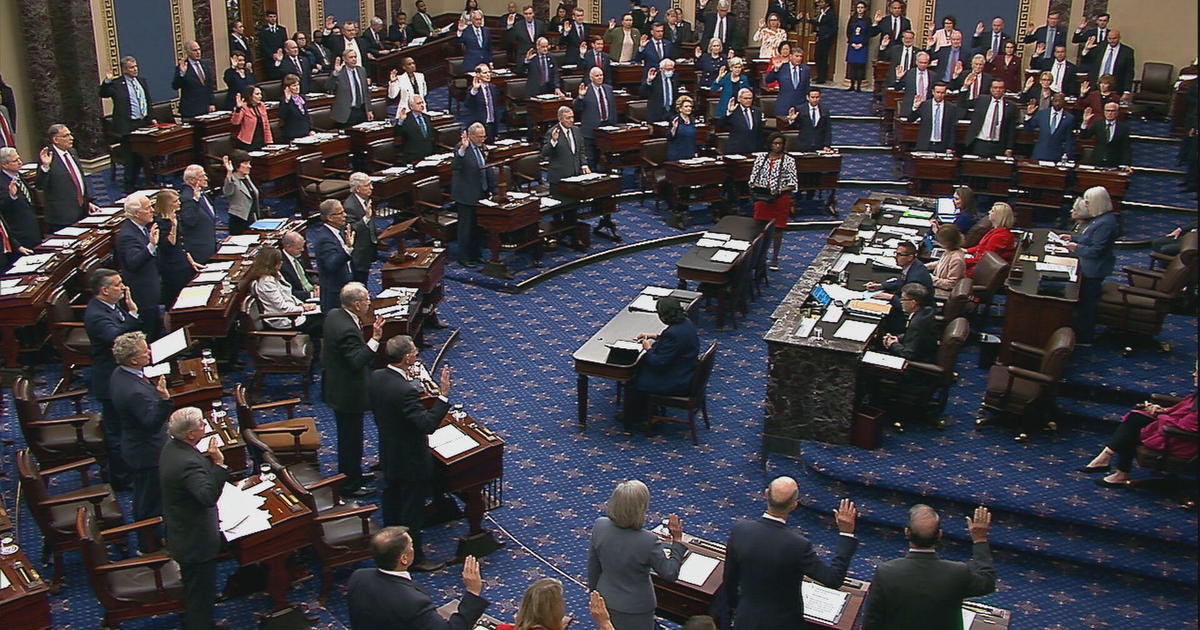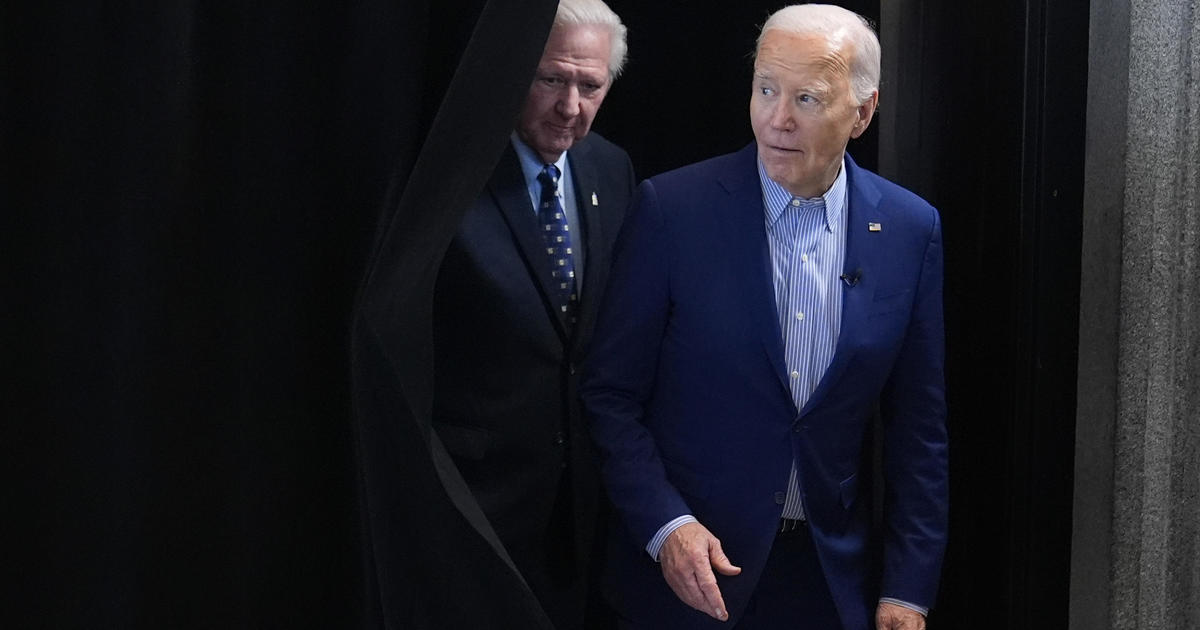Transcript: Former DHS Secretary Jeh Johnson on "Face the Nation," January 13, 2019
The following is a transcript of the interview with Jeh Johnson, former homeland security secretary, that aired Sunday, Jan. 13, 2019, on "Face the Nation."
MARGARET BRENNAN: We're joined now by former Department of Homeland Security Secretary Jeh Johnson. Welcome to "Face the Nation."
JEH JOHNSON: Margaret, thanks for having me.
MARGARET BRENNAN: In addition to being Homeland Security Secretary, before that you had also been general counsel at the Pentagon.
JEH JOHNSON: Correct.
MARGARET BRENNAN: So I know you're very familiar with some of the legal authorities here--
JEH JOHNSON: Yes.
MARGARET BRENNAN: --that we may need to-- to look at, because the President says that he may declare a national security emergency in order to get border funding for this wall. Take it from other monies that Congress had already approved and use it in a way they didn't approve. Does he have the ability legally to do this?
JEH JOHNSON: Well, first, Margaret, I just have to say there is an emerging crisis in Homeland Security on our border, by taking the very workers we depend upon for our security, land, sea, air, Secret Service, Coast Guard, Border Patrol, customs agents and so forth, and inflicting on them all sorts of stress and anxiety in their personal life about whether they're going to be paid and when. That's the security crisis that I see from the workforce in DHS.
MARGARET BRENNAN: Mm-Hm.
JEH JOHNSON: Now when it comes legally to whether or not the President can declare a national emergency to get around the dispute, earlier in the week the administration seemed to be talking about using a Department of Defense authority to take money that's been designated by Congress for military construction toward another project. The law specifically allows for that upon the declaration of a national emergency. But that particular provision is typically used overseas to support the military like building detention facilities or military housing. The lawyers in the administration now seem to have come to a provision that allows for a reprogramming, as we refer to it, taking money from Army's civil works projects here in the United States that were at some point essential to national defense and then redesignating and reprogramming it for some other Army civil works project.
MARGARET BRENNAN: Some of that aid money for Puerto Rico and--
JEH JOHNSON: Correct.
MARGARET BRENNAN: --money for California--
JEH JOHNSON: So, in my view, that's probably slightly more legally plausible. The earlier defense authority was really trying to jam us square peg in a round hole.
MARGARET BRENNAN: Mm-Hm.
JEH JOHNSON: This one is slightly more plausible, but politically highly objectionable because you're taking billions of dollars away from important civil works projects to recover from the hurricanes and the wildfires. And I-- I would predict there'd be huge, huge objection to doing that. Ultimately, this-- this has to be something for our political leadership to work out--
MARGARET BRENNAN: Mm-Hm.
JEH JOHNSON: --to get the government back to work. That's the most basic function of our civilian political leadership, to keep the government open and pay the workers.
MARGARET BRENNAN: Well, and to your point, it is worth what you underscored there, that a number of people who work on national security issues aren't getting paid because of this--
JEH JOHNSON: The people we--
MARGARET BRENNAN: --border crisis.
JEH JOHNSON: --depend upon to find explosives and luggage, to find weapons and luggage, the people we depend upon to secure our borders to look for contraband at ports--
MARGARET BRENNAN: Mm-Hm.
JEH JOHNSON: --to look for narcotics at ports, are the people that are under great stress right now because of this shutdown. It be must be leading-- I think I know this workforce. It must be leading to all kinds of uncertainty, stress and anxiety, and frankly, anger and resentment. We see reports of TSOs calling in sick. And if this is not resolved soon, I predict that that's going to go in the wrong direction and we're going to start seeing longer and longer lines at airports.
MARGARET BRENNAN: When you were at DHS, I know you said that-- at that time in 2015, you saw the influx and apprehensions of children and family units as an emerging crisis.
JEH JOHNSON: Yeah.
MARGARET BRENNAN: Now the Trump administration is seeing record numbers of those family--
JEH JOHNSON: Yes.
MARGARET BRENNAN: --units coming across the border. They're saying this is a crisis now, and it sounds like the one you saw coming. So this is a unique challenge for them. Are they wrong to call that a crisis?
JEH JOHNSON: It is very definitely humanitarian crisis because of the poverty and violence in Central America. And the way to deal with this problem, frankly, is make a long-term investment in helping to eradicate the poverty and violence in the three countries that are probably the most violent on Earth. That's not a quick, simple, easy fix which Washington likes.
MARGARET BRENNAN: El Salvador, Honduras and Guatemala.
JEH JOHNSON: Correct. And so we need to make a long-term political commitment to investing and dealing with those push factors, otherwise we're going to continue to deal with this problem for a very long time.
MARGARET BRENNAN: Border wall, what I hear you saying, not the most effective way. Let me get, though, to-- to the nuts and bolts of the family members here. Because the Obama administration faced some challenges on the question of whether they could detain families together--
JEH JOHNSON: Yes.
MARGARET BRENNAN: --for more than twenty days.
JEH JOHNSON: Mm-Mm.
MARGARET BRENNAN: That's at the heart of the Trump administration's, you know, defenses as to why they were justifying the separation of families. So what alternatives are there?
JEH JOHNSON: Well, you're referring to the Flores decision--
MARGARET BRENNAN: Yes.
JEH JOHNSON: --which imposed basically a limit on us to hold people for longer than-- than twenty days. I think that there has to be a range of tools that DHS can go to in-- in a crisis when you see a spike like this. Again, it requires a long-term investment and the push factors. But we need things like-- we, you know, we can always assess whether there is more border security that's necessary. More surveillance, more road, perhaps, fortifying walls. In my judgment, there also needs to be more immigration judges--
MARGARET BRENNAN: Mm-Hm.
JEH JOHNSON: --to move these cases along. But it does require a range of things and a long-term political commitment to dealing with the underlying factors that lead to these crisis.
MARGARET BRENNAN: Very quickly, do you expect the Supreme Court to uphold the DACA ruling?
JEH JOHNSON: I-- I hesitate to predict what this Supreme Court will do.
MARGARET BRENNAN: Mm-Hm.
JEH JOHNSON: I think that there is adequate legal basis for the program.
MARGARET BRENNAN: All right. At the heart of-- of some of these potential solutions. So thank you very much.
JEH JOHNSON: Thank you.



